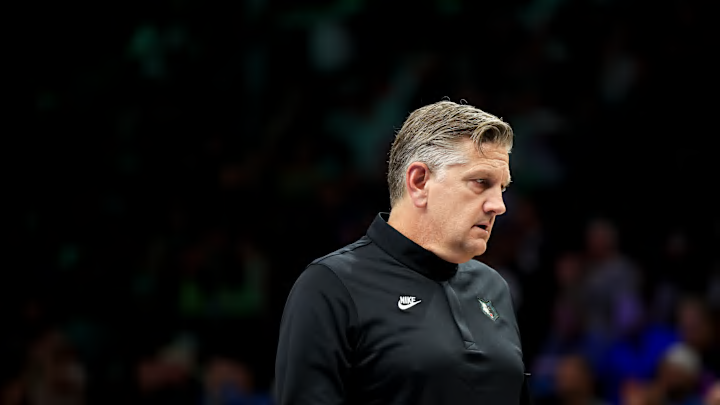The Timberwolves' season has gotten off to a rocky 4-3 start, with many fans pointing blame at head coach Chris Finch. Seven games into the season, many Wolves fans have looked to reasons both on and off the team to part ways with Finch.
Since taking the helm early on in the 2021 season, after the Timberwolves fired former head coach Ryan Saunders, Finch has risen to the winningest head coach in Timberwolves history, sitting at a .566 winning percentage in 376 games coached.
In addition, Finch has led the Timberwolves to four consecutive playoff appearances, including two Western Conference finals appearances. Chris Finch has been nothing short of a culture-shifter for the Timberwolves, but his departure may be necessary for the Timberwolves to take another ascension.
The Rob Dillingham conundrum
In the 2024 draft, the Timberwolves made a bold decision to trade up in the draft, acquiring the No. 8 pick from the San Antonio Spurs for two first-round draft picks, including their 2031 unprotected draft pick. With this pick, they drafted guard Rob Dillingham, with the hopes that he could eventually become the point guard to pair with Anthony Edwards.
Following this pick, the Timberwolves would make the Karl-Anthony Towns trade, ultimately forcing the Timberwolves to embrace some growing pains throughout the 2025 regular season. Dillingham would, unfortunately, be iced out of the rotation to begin the season, but would finally get a chance after an injury to Donte DiVincenzo.
During this stretch of consistency from mid-January to mid-February, Dillingham showed flashes of elite playmaking and shot-creation. Including a game where he scored 19 points and dished out eight assists against the Utah Jazz.
The stretch of play was not all good, though. Dillingham was often reckless with his shot selection and was a severe defensive liability. These problems eventually got Dillingham pulled from play, falling back towards the end of the bench. Overall, Dillingham averaged 10.5 points and 4.5 points as a rookie.
Fast-forwarding to the offseason, Minnesota opted for in-house development, rather than signing a point guard, which by this point became a glaring hole on the team. This notion led fans to believe that Dillingham would embrace a larger role, especially considering Mike Conley entering his 19th season.
Through seven games, the point guard issue has once again proved detrimental, especially considering Edwards' injury. While Jaden McDaniels and Julius Randle have stepped up in the absence of Edwards, neither can replace the production from the guard standpoint that Ant provides.
While Dillingham cannot match the offensive firepower of Edwards, he may serve as the most viable option at the point guard role. Dillingham is the only guard on the roster outside of Edwards to possess any sort of explosiveness and quickness to get to the rim.
Thus far Dillingham is averaging just 13 minutes and received a DNP during the Wolves season opener when Edwards was healthy.
As it currently sits, the Dillingham trade is looking like a massive blunder for the Timberwolves. While Dillingham is a volatile player, Finch must consider the upside of allowing Dillingham to build confidence and potentially become the running mate next to Edwards.
Josh Minott is showing that Finch holds young players back
Former Timberwolves forward Josh Minott has looked like a completely new player. After three seasons spent in Minnesota, Minott signed a two-year deal with the Boston Celtics, hoping to establish himself as an NBA player. Minott has done exactly that, rising above expectations and usurping the starting four, with the Jayson Tatum injury.
After being drafted 45th overall in the 2022 draft, Minott, like many other rookies under Finch, was buried on the bench, only receiving garbage time minutes. However, Minott showed some promise in those minutes, showing great defensive energy, athleticism, and ability to crash the offensive and defensive glass.
As has been the case with Dillingham and other young talent, Minott was subsequently buried on the end of the bench, which would last through his sophomore season as well. In the 2025 season, Minott would begin to receive short stints of play, coming in for defensive purposes, but was playing with an extremely short leash.
Minott only notched double-digit points six times and 20-plus minutes with the Wolves. All in all, Minott averaged just 5.3 minutes and 2.3 points during his three-year tenure with the Wolves.
Just months later, Minott has found a team that he can build confidence with, as well as a team that believes in him. Minott is now a starter with the Celtics, averaging 20.9 minutes, 7.4 points, and 6.7 rebounds.
When we look at what is happening with Dillingham, along with other young players, and see the growth of Minott, it's fair to question Finch's place with this team. Considering the young nature of this team, it has become unjustifiable not to see what your youth players can do.
It is unreasonable for Finch to ice players like Dillingham, Terrence Shannon Jr., and Joan Beringer, along with the other young players, and immediately thrust them into the game and expect them to make a real impact. While Dillingham is receiving more play time as a result of the Edwards injury, history tells us that he will be cast back to the end of the bench as soon as he returns.
This season may be a make-or-break season for Finch. In a franchise that has experienced almost no stability, Finch has offered the first stability in twenty years. Triggering the decision to get rid of Finch could help Minnesota reach another level, or become a disastrous step back into mediocrity. If Finch sticks around, he needs to adapt his style.
